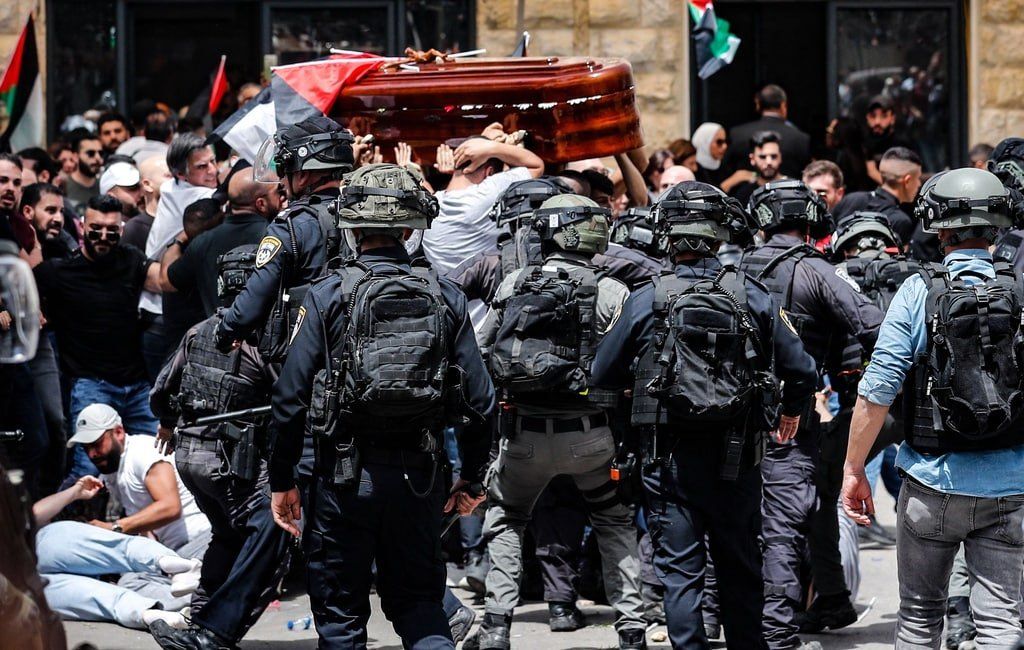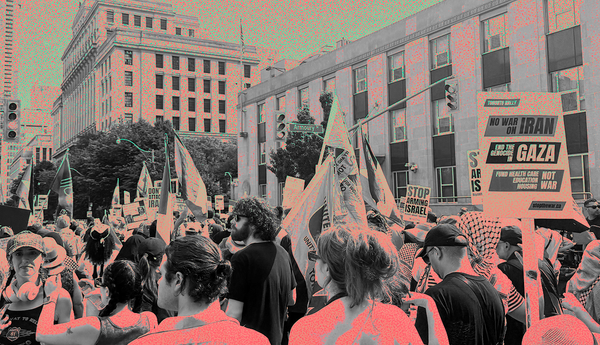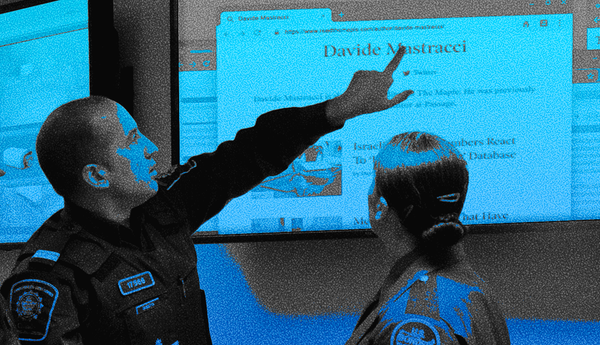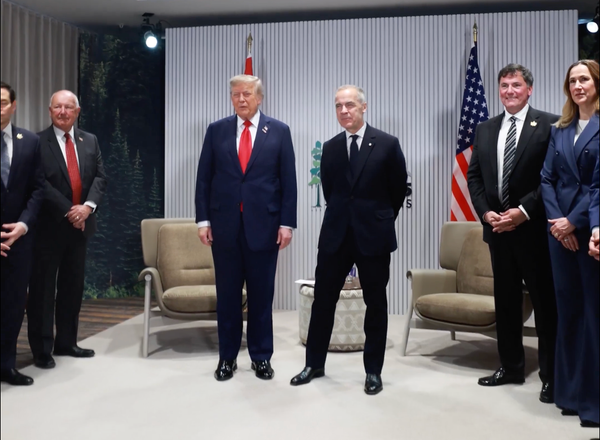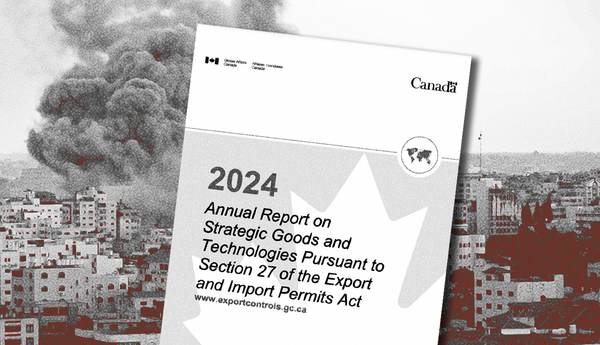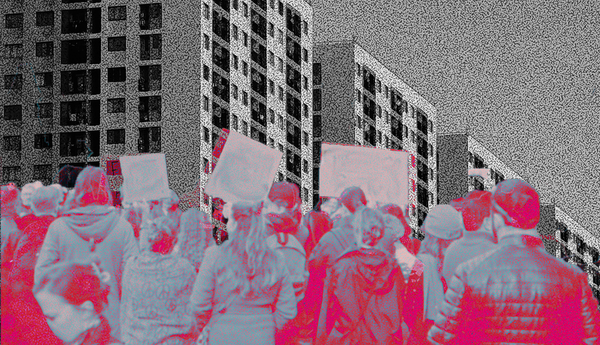Senior Global Affairs Canada (GAC) staff and Canadian diplomats closely monitored responses from the United States, United Kingdom and European Union after Israel’s killing of Palestinian journalist Shireen Abu Akleh before issuing their own statements, documents obtained by The Maple reveal.
As reported by The Maple this week, the Canadian Representative Office in Ramallah sent GAC a report on May 11, the day Israeli forces shot and killed Abu Akleh during a military raid on the city of Jenin, noting Israel’s poor track record of properly investigating violence by its security forces against journalists.
The report also noted that Canada’s diplomatic missions in Israel and Palestine had both published tweets expressing shock at the killing “in line with likeminded [sic],” referring to representatives of key international allies: The United States, United Kingdom and European Union.
The report included screenshots of tweets posted by the U.K. Ambassador to Israel Neil Wigan, the U.S. Ambassador to Israel Tom Nides, United Nations (UN) Special Coordinator Tor Wennesland and UN Resident and Humanitarian Coordinator Lynn Hastings.
None of those officials named Israel as responsible for killing Abu Akleh, and none specifically called for an independent investigation by the International Criminal Court (ICC) into her death. In the early hours of May 11 eastern time, Wigan tweeted that he was “deeply saddened” by Abu Akleh’s death, and called for a “rapid, thorough and transparent investigation.”
A few minutes after Wigan’s post, Nides tweeted that he was “very sad” to learn of the highly respected Al Jazeera reporter’s death, and encouraged “a thorough investigation into the circumstances of her death.” Wennesland and Hastings called for “thorough” and “prompt” investigations respectively.
Immediately after Abu Akleh’s death, Al Jazeera reporters and eyewitnesses identified Israeli forces as responsible for the killing.
Approximately one hour after Nides’ tweet, the Canadian Representative Office in Ramallah echoed the messaging of both the U.K. and U.S. representatives, stating that the office was “shocked and saddened” by Abu Akleh’s death and calling for a “thorough & transparent investigation.”
The Canadian Representative Office in Ramallah is led by diplomat Robin Wettlaufer, although it is unclear whether she personally authored the report sent to senior GAC staff or the statement issued via Twitter on May 11.
The Maple found no statements regarding Abu Akleh’s death posted on the Canadian Embassy in Israel’s Twitter account, as suggested in the Canadian Representative Office’s report.
By approximately 4:30 p.m. eastern time on May 11, Foreign Affairs Minister Melanie Joly had issued a statement echoing the language used by other governments and diplomatic agencies with close ties to Israel. Joly tweeted: “Canada calls for a thorough investigation into the killing of Shireen Abu Akleh.” The statement excluded specific calls from human rights activists for an independent investigation.
Human rights advocates have called for an “independent” investigation by the ICC into Abu Akleh’s death explicitly because of Israel’s notoriously poor record when investigating acts of violence committed by Israeli forces against journalists.
Officials gauged international response before responding to funeral attack
Further emails obtained by The Maple reveal that GAC staff and diplomats also monitored responses from Israel-allied countries to an attack by Israeli security forces on Abu Akleh’s funeral procession before they issued their own statements.
On May 13, horrific footage of Israeli forces beating Abu Akleh’s pallbearers with batons and causing them to almost drop her casket sparked widespread outrage and condemnation. According to Al Jazeera, the Israeli forces launched their attack on the funeral procession because the mourners did not want them to walk alongside Abu Akleh’s coffin.
Following the attack, GAC advisor Ghislain Chaput notified GAC analysts and communications staff that Lisa Stadelbauer and Robin Wettlaufer, Canada’s lead diplomats in Israel and Palestine respectively, intended to issue tweets “regretting the incident, expressing concern and calling for calm and respect for mourners.”
Minister Joly’s deputy director of communications, Emily Williams, then asked to review the tweets. In a separate email, another GAC staffer reiterated that Joly’s office wanted to vet the tweets “before publishing.”
At around 12 p.m. eastern time on May 13, Yasmine Baradei, a senior communications advisor, sent drafts of the proposed tweets along with copies of “LM [like-minded] reactions” (referring to statements from Canada’s international allies) to Williams, Joly’s digital strategist, her press secretary, her director of communications, her director of Parliamentary affairs, assistant deputy minister Stephanie Levesque and other senior GAC staff.
The “like-minded” reactions came from Dutch ambassador to Israel Hans Docter, the EU Delegation to the Palestinians, EU Ambassador to Israel Dimiter Tzantchev, and the French General Consulate, all of whom represent countries or blocs that have friendly relations with Israel.
Docter condemned the “disproportionate and disrespectful behaviour of the Israeli police.” Tzantchev’s statement expressed similar concerns.
Later in the afternoon, a GAC political counsellor forwarded tweets from Swedish Minister of Foreign Affairs Ann Linde and the Swedish consulate in Jerusalem. Linde struck a less condemnatory tone than other officials, stating that she was “shocked by scenes of violence” at the funeral, and that it was “important that authorities seek to lower tensions.”
At around 1:30 p.m. eastern time, Stadelbauer and Wettlaufer were given the green light by David Murphy Haglund, a deputy GAC political director, to post their tweets.
Stadelbauer wrote: “Appalling scenes from the funeral procession of Shireen Abu Akleh. Heavy use of force by Israeli security unnecessarily inflamed an already difficult situation. Mourners should have been given the space to grieve in dignity.”
In a near-identical tweet, Wettlaufer wrote: “Appalling scenes from the funeral procession of [Shireen Abu Akleh], and the unnecessary use of force by Israeli police. Mourners should have been permitted to grieve in dignity.”
For her part, Minister Joly did not issue a statement on the funeral attack until nearly four days later. During a media availability on May 16, Joly said: “We saw the use of force against mourners and family members, [that] is completely unacceptable.”
Tom Woodley, president of the advocacy group Canadians for Justice and Peace in the Middle East (CJPME), told The Maple he was not surprised that senior GAC officials and diplomats monitored international responses before issuing their own statements.
“You don’t demonstrate leadership by waiting to see what others will do,” said Woodley. “It shows just how servile this government has become to pro-Israel interests. It also shows how this government’s talk about the international rules-based order is nothing but lip service.”
“The Trudeau government has essentially refused to put any pressure on Israel for its human rights violations,” he continued. “While the Trudeau government has made gestures toward the Palestinians – restoring Canadian funding for Palestinian refugees, and expressing support for Palestinian self-determination at the UN – it has consistently refused to condemn Israel on its human rights record.”
Given the fact that three respected international human rights groups have concluded that Israel is an apartheid state, Woodley wonders what it will take for the Trudeau government to directly condemn Israel.
“How many Palestinian journalists must be shot, how many Palestinian children must be arrested, and how many Palestinian political prisoners need to languish in Israeli jails before this government will utter a word of disapproval?,” said Woodley.
Alex Cosh is the managing editor of The Maple.
Edited by John Young.


